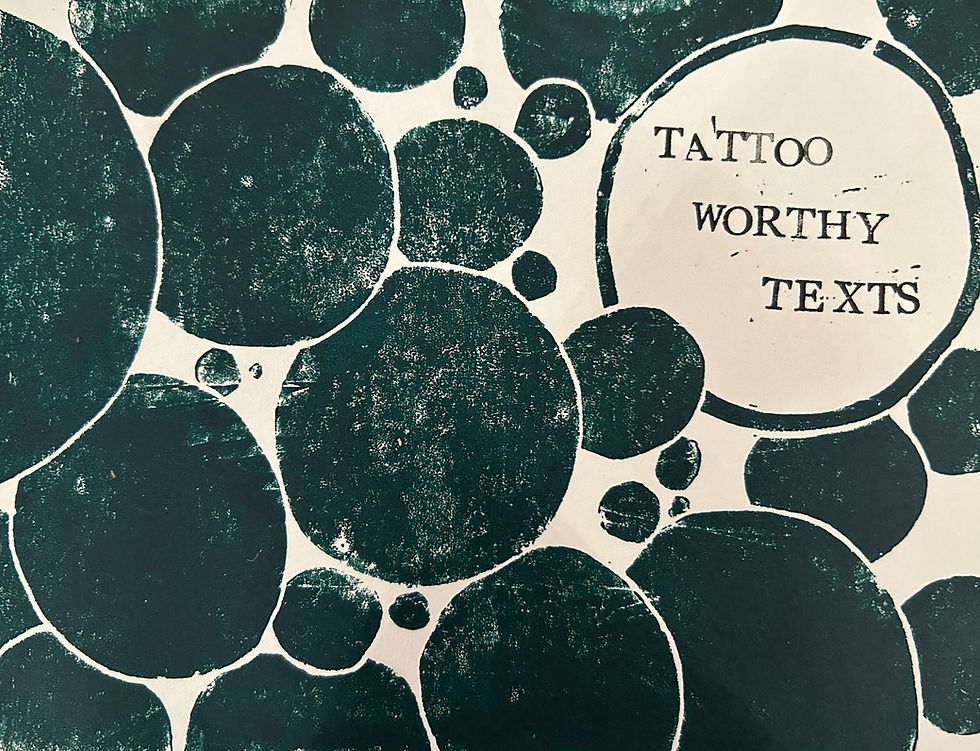Tattoo Worthy Texts 1 - Handle with Care
- rabbirobynashworth
- Dec 20, 2023
- 3 min read
Updated: Feb 23, 2024

Whenever I teach, I hear myself, saying, ‘if I could get this phrase tattooed, I would!’ I am obsessed with words. I am hooked on discovering teachings that connect all the dots and turn my thinking upside down. I love finding words that break open new possibilities I didn’t even know existed. Aside from my very low pain threshold, I would run out of space to get all of the words that have transformed me tattooed. So in lieu of finding a parlour that could do the miraculous, I’m going to share some of my favourite words and sentences that have blown me away. Knowing that the Internet is a type of memorial, given the impossibility of erasing anything that is ‘out there’ digitally, I hope that these words start conversations of critical thinking and connection.
PART ONE - TATTOO WORTHY TEXTS HANDLE WITH CARE
'Our reading practices, in part, construct the symbolic world we inhabit and serve to motivate and justify our actions. Because words, particularly biblical words, possess the power to muster armies, we must approach the text with a certain ethical consciousness. In addition, this influence means that we may start the emancipatory process in the world by showing solidarity with the oppressed of the text.'
Carleen Mandolfo. 2007. Daughter Zion Talks Back to the Prophets: A Dialogic Theology of the Book of Lamentations. Atlanta: Society of Biblical Literature, p.27.
Yaaas! This quotation, for me, says IT ALL. Carleen Mandolfo has summarised in three sentences why I am a rabbi, a practicing Jew, a former human rights lawyer and a biblical scholar.
I first came across this quotation at Leo Baeck College in a class with Rabbi Dr Deborah Kahn-Harris in her phenomenal module on Megillot (the scrolls). I was blown away by these words. In the first sentence, the quotation acknowledges the power of language and story. With words we create images which in turn create worlds. With one utterance we can create something beautiful or destroy something beautiful. What we say and how we say it matters. We cannot brush off harmful rhetoric because we understand that a 'symbolic world' is created and that is real enough. Our foundational creation narrative in Bereshit/Genesis tells us as much as we see G?d name an entire world into being.
Mandolfo. in this second sentence, then draws our attention to biblical words and their power to 'muster armies'. How painful a reality that is. From the Hebron massacre in 1994 where Baruch Goldstein murdered 29 worshipping Muslims and injured many more citing the Book of Esther as a proof text to verses from Deuteronomy and Leviticus being appropriated to deny same-sex love and unions. Armies are mustered, people are excluded, violence is meted out, all in the name of the holy Torah. This is why Mandolfo cautions that we approach the text with 'a certain ethical consciousness.' Not only do we know that what we say matters, here, crucially we learn that how we read matters. We can choose to throw away any material we deem to be harmful or open to misinterpretation but in so doing we deny the violence in our world and in ourselves. We can choose to apologise for the text and explain its historical context but in so doing we ignore the power the text still holds in constructing our world today. Or we can choose to read responsibility and critically. We can meet the text where it is - just us and the text. Not interpreted to us by others but us, face-to-face with the text. We look at the 'violence both in the text and the in the outworking of the texts' (Johanna Stiebert, Rape myths, the bible and metoo.). If we can unpick the rhetoric of hate, the fear of the other, the power dynamics, the structural inequalities that hold up these narratives we have a hope of deconstructing them in our world today. If we can protest these texts in encounter with them then we can uplift the heart of the Torah which demands we seek justice and liberation always.
In the last sentence, Mandolo shows us how to do read - to show 'solidarity with the oppressed of the text'. We focus on the untold stories, on the victims/survivors left in the wake of the violent texts and rhetorics. We tell their stories. We tell our stories. We follow the commandment to love the stranger, for we were strangers. We tell their stories. We tell our stories. In this way the Torah lives and transforms from a tool for oppression and domination to a tool for liberation and justice for all.




Comments